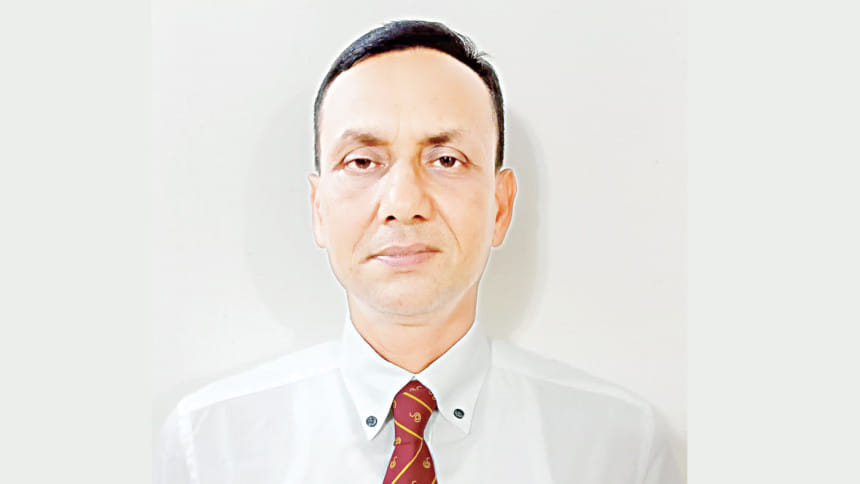Greener, efficient and worker-friendly factory

Major Md Motaher Hossain,
(retd)DGM (Head of HR and Admin), KDS Textile Mills Ltd
The Daily Star (TDS): What specific green practices or innovations helped your factory secure the Green Factory Award 2025?
Md Motaher Hossain (MMH): At KDS Textile Division, we have implemented a wide range of green practices that contributed to us receiving the Green Factory Award 2025. In terms of energy efficiency, we use renewable energy sources such as solar panels, wind, and biogas. We have installed high-efficiency lighting systems including LED lights, and we use energy-efficient machinery combined with automation. To manage our energy consumption, we operate with energy monitoring and management systems across our facilities.
In the area of water conservation, we have established rainwater harvesting systems, along with technologies that allow us to recycle and reuse water. Low-flow fixtures are installed throughout our operations to reduce water consumption, and we operate on-site wastewater treatment plants (ETPs) to ensure responsible water discharge.
Our waste management strategy is based on the principles of reduce, reuse, and recycle. We have systems in place for the safe disposal of hazardous waste and composting of organic waste to ensure nothing goes to landfill unnecessarily.
To improve air quality and control emissions, we use low-emission fuels and clean technologies. We also have systems for controlling dust and volatile organic compounds (VOCs), along with proper ventilation and air filtration infrastructure.
Our building design follows eco-friendly standards. We use sustainable construction materials and have integrated LEED certification criteria. Our facilities include proper insulation, natural lighting systems, and passive cooling designs. We have also introduced green roofing and rooftop gardens as part of our sustainability efforts.
Worker health and safety is a major component of our sustainability vision. We ensure good indoor air quality and maintain ergonomic workplace designs. We've taken measures to reduce noise levels and ensure safe use of machinery. In addition, we provide worker-friendly amenities such as canteens, rest areas, and medical facilities.
We have also secured several environmental certifications, including ISO 14001, LEED, and IFC EDGE, demonstrating our compliance with both national and international green standards. Sustainability monitoring and reporting are conducted regularly through environmental audits, carbon footprint tracking, and transparent public reporting of our environmental performance.
TDS: How has adopting green practices benefitted your company?
MMH: Adopting green practices has resulted in significant benefits for our company. From a cost-saving perspective, improved energy efficiency has reduced our electricity and fuel expenses, while our water conservation measures have lowered utility costs. Our efforts in waste reduction and recycling have also cut down on disposal fees and raw material costs.
Our brand image and public reputation have also improved. More and more customers prefer eco-friendly brands, and by demonstrating environmental responsibility, we have strengthened public trust, increased customer loyalty, and improved our marketability. Certifications such as LEED and ISO 14001 have helped us stand out in a competitive marketplace.
Environmentally sustainable operations have also given us a competitive advantage by helping us attract eco-conscious clients and investors. These practices have opened doors to green markets and allowed us to qualify for government contracts that require sustainability credentials.
We have also benefitted by staying ahead of environmental regulations, reducing the risk of penalties, legal action, or shutdowns due to non-compliance. Internally, a clean and green workplace has contributed to better employee health, morale, and productivity. We have found that this helps us attract and retain talent, especially among younger professionals who prioritise sustainability in their workplaces.
Moreover, implementing green initiatives has spurred innovation and efficiency across our operations. These practices often lead to process improvements and encourage creative problem-solving. We are also developing new sustainable products and services that align with global demand.
Ultimately, all of these actions support our long-term sustainability goals by conserving natural resources and reducing our exposure to climate-related risks and supply chain disruptions.
TDS: What challenges did you face in implementing sustainable practices?
MMH: The most significant challenge was the high initial investment required. Installing solar panels, energy-efficient machinery, and water treatment systems demanded considerable capital, which made decision-making difficult at the outset.
Another challenge was the lack of awareness and expertise. Many employees did not fully understand the long-term benefits of sustainability, and we faced a shortage of skilled professionals or consultants to support the implementation process.
There was also some resistance to change. Employees and even some members of management were reluctant to move away from traditional practices due to concerns about disrupting current operations or harming short-term profitability. However, with patience and consistent communication, we managed to overcome these barriers.
TDS: What are your plans for further expanding and strengthening green initiatives within your operations?
MMH: We have several plans in place to strengthen our green initiatives. We aim to plant more trees within our premises and expand our rainwater harvesting systems. We are planning to install additional solar panels to further increase our reliance on renewable energy.
We also plan to provide more targeted training programmes for our employees, ensuring that sustainability practices are well understood and embedded across the workforce. Increasing awareness among staff about the importance of maintaining green practices will remain a core part of our environmental strategy moving forward.
TDS: What kind of policy or institutional support would you like to see from the government to help scale up your green efforts?
MMH: Government support is crucial if we are to scale our green initiatives meaningfully. Tax incentives would be particularly helpful. For instance, tax deductions or exemptions for investments in energy-efficient machinery, solar panels, and rainwater harvesting systems would encourage more companies to adopt green practices. We also recommend reduced import duties on green technologies.
In terms of financing, subsidised loans or grants from government banks for green upgrades would be highly beneficial. Establishing Green Investment Funds or public-private partnerships could also provide a much-needed financial cushion for industries willing to transition.
We believe the government should establish clear national standards for waste management, energy efficiency, emission limits, and resource usage. It should also mandate Environmental Impact Assessments (EIAs) for all new factories or significant expansions.
To address the skills gap, the creation of technical training centres would be immensely valuable. These centres could offer vocational programmes in sustainable manufacturing, environmental engineering, and green supply chain management. Collaborations with universities and NGOs to support research and development in green technologies would also help promote innovation in this space.

 For all latest news, follow The Daily Star's Google News channel.
For all latest news, follow The Daily Star's Google News channel. 



Comments